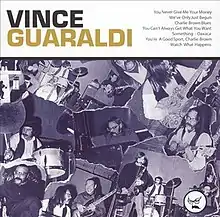Oaxaca (album)
Oaxaca is a compilation album by American jazz pianist Vince Guaraldi released by D & D Records (Guaraldi's briefly resurrected label) in 2004. The album is a mix of previously unreleased studio and live recordings taped in 1970 and 1971.[2]
| Oaxaca | ||||
|---|---|---|---|---|
 | ||||
| Compilation album by | ||||
| Released | October 19, 2004 | |||
| Recorded | 1970–1971 | |||
| Venue |
| |||
| Studio | Golden State Recorders, San Francisco, California | |||
| Genre | ||||
| Length | 53:05 | |||
| Label | D & D | |||
| Producer | David Guaraldi Michael Graves | |||
| Vince Guaraldi chronology | ||||
| ||||
| Review scores | |
|---|---|
| Source | Rating |
| All About Jazz | |
| Five Cents Please | |
Background
In the mid-2000s, Vince Guaraldi's son, David Guaraldi, worked with audio archivist Michael Graves at his Atlanta, Georgia-based Osiris Studio, in an effort to restore a wealth of unreleased recorded material from his father's archives.[2] The recordings on Oaxaca come from a variety of sources: some songs were performed live at In Your Ear, a jazz club based in Palo Alto, California; one is performed at The Matrix in San Francisco, with remaining tracks taped at Golden State Recorders in San Francisco.[2]
The release features covers of The Rolling Stones' "You Can't Always Get What You Want" and The Beatles' "Something" and "You Never Give Me Your Money", both from Abbey Road.
Oaxaca was released on CD only. It did not receive a vinyl release.[2]
Critical reception
All About Jazz critic David Rickert commented that Oaxaca "could be called In A Silent Way, Charlie Brown," adding that Guaraldi is "powered by a rhythm section well versed in providing a driving rock beat. Armed with an arsenal of electronic devices, they turn 'You Can't Always Get What You Want' into a ferocious squall, yet display a gentler touch on 'Something.' It's a testament to Guaraldi's abilities as a musician that all this works as well as it does, and his treatments of these relatively new songs show a skill at interpretation that was never quite apparent in his early days as a pianist dealing with standards." Rickert concluded by saying, "it should come as no surprise that Guaraldi is still capable of crafting amazingly catchy melodies, and the title track is one of his finest."[1]
Derrick Bang, Guaraldi historian and author of Vince Guaraldi at the Piano, described the title track as "a catchy little tune full of sparkle and sass, which sounds like it could have been a Peanuts theme."[2]
Track listing
All tracks are written by Vince Guaraldi, except where noted
| No. | Title | Writer(s) | Notes | Length |
|---|---|---|---|---|
| 1. | "Charlie Brown Blues" (aka "Play It Again, Charlie Brown"/"Charlie's Blues") | recorded at Golden State Recorders, March 31, 1971[3] | 5:00 | |
| 2. | "Oaxaca" | recorded at Golden State Recorders, March 31, 1971[3] | 3:10 | |
| 3. | "We've Only Just Begun" | recorded at Golden State Recorders, March 31, 1971[3] | 4:54 | |
| 4. | "You Can't Always Get What You Want" (live) | 16:13 | ||
| 5. | "Something" (live) | George Harrison | 3:55 | |
| 6. | "Center Court" (retitled "You're a Good Sport, Charlie Brown") | studio version released on Vince Guaraldi and the Lost Cues from the Charlie Brown Television Specials; featured in the Peanuts television special You're a Good Sport, Charlie Brown (1975) | 2:35 | |
| 7. | "Watch What Happens" (live, incomplete) | from the film The Umbrellas of Cherbourg | 5:40 | |
| 8. | "You Never Give Me Your Money" | recorded at Golden State Recorders, March 31, 1971[3] | 6:53 | |
| 9. | "Oaxaca" (alternate take) | recorded at Golden State Recorders, March 31, 1971[3] | 4:46 | |
| Total length: | 53:05 | |||
Personnel
Credits adapted from CD liner notes.
- Vince Guaraldi Quartet
- Vince Guaraldi – piano, Fender Rhodes, Hammond B-3, clavinet
- Vince Denham – saxophone, flute
- Koji Kataoka – electric bass
- Mike Clark – drums
- Additional
- Derrick Bang – liner notes
- David Guaraldi – producer
- Michael Graves – engineer (audio restoration), producer
References
- Rickert, David (November 18, 2004). "Vince Guaraldi: Oaxaca". allaboutjazz.com. All About Jazz. Retrieved 7 May 2020.
- Bang, Derrick. "Vince Guaraldi on LP and CD: Oaxaca". fivecentsplease.org. Derrick Bang, Scott McGuire &. Retrieved 5 May 2020.
- Bang, Derrick. "Vince Guaraldi Timeline: 1971". fivecentsplease.org. Derrick Bang, Scott McGuire. Retrieved 30 January 2021.